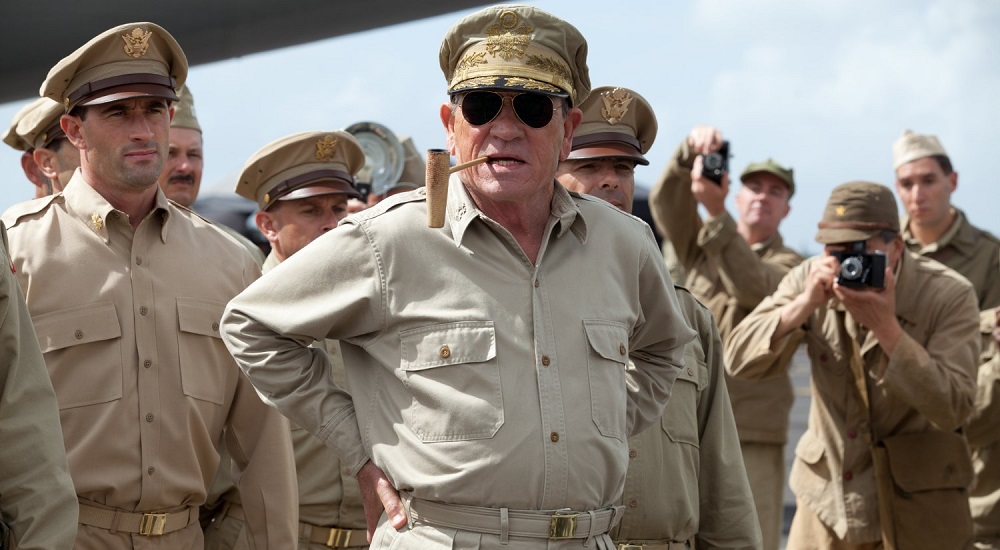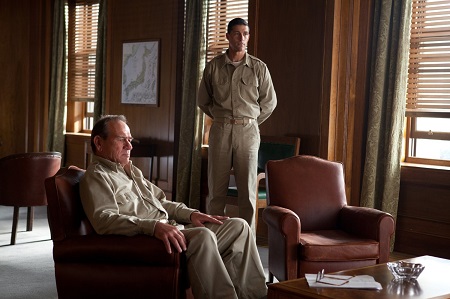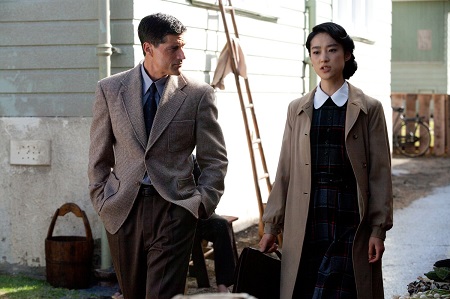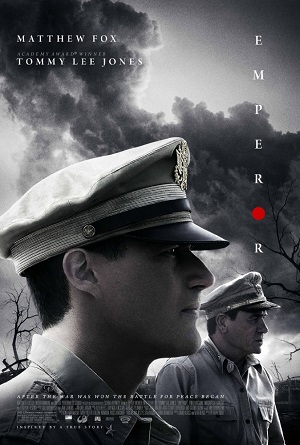
Jones Commands Uneven WWII History Lesson Emperor
The Japanese have surrendered brining WWII to an end. Revered General Douglas MacArthur (Tommy Lee Jones) is tasked by President Truman to rebuild what is nothing less than a devastated wasteland of a country. As part of this, he and those under his command are ordered to bring to justice the war criminals who committed unspeakable atrocities, their crimes to be made public inside a courtroom for all the world to see.
As part of this, he assigns Japanese expert General Bonner Fellers (Matthew Fox) to analyze the part Japanese Emperor Hirohito (Takatarô Kataoka) played in the planning of the war. He is given ten days to decide whether or not this man, revered as a living God by his people, should stand trial for war crimes and, if convicted, be publicly hanged, his decision playing a vital part in whether Japan is able to rebuild or if it instead will descend into uncontrollable chaos.
Based on historical fact but littered with fictional flourishes, Emperor is both incredible and insulting, oftentimes at the same time. Directed by Peter Webber (Girl with a Pearl Earring) who is working from a script by David Klass (Kiss the Girls) and Vera Blasi (Tortilla Soup), and loosely inspired by the book by Shiro Okamoto, the movie on one hand is a subtle, emotionally-thrilling procedural following an intense investigation centered on Japanese culture and ideals. But on the other it is a maudlin saga of a love story steeped in tragedy, General Fellers working at cross purposes as he augments his investigation of the Emperor with the desperate search for a former love, a school teacher named Aya (Eriko Hatsune), whom he fears might be dead.
Half of the movie works splendidly, Fox showing the requisite gravitas required to lead such an investigation while Jones pops up now and again to steal scenes with fiery panache. As Fellers descends deeper within the rabbit hole the answers he ascertains are not always ones he understands, even with his extensive study of Japanese culture, leading him to conclusions that aren’t always supported by the circumstantial facts on hand. It’s fascinating stuff, all of it building to the legendary meeting between a General tasked with a ruined country’s rebuilding (as well as its eventual move towards a version of representative democracy) and the fallen Emperor who urged his people to lay down their arms.
It is the other half of the story where the problems lie. The romance between General Fellers and Aya adds nothing, only allowing the woman’s military-minded uncle, the fictional General Kajima (portrayed splendidly by Japanese legend Toshiyuki Nishida), to pop up every so often and spell out for the audience what is going on and why. The connection between Fox and Hatsune is tenuous at best, the two never achieving a believable emotional bond, thus making the former’s desperate search for the latter hardly worthy of a investment.
It did not help that I alternated between admiring Fox’s performance to suddenly being annoyed by it, the actor working best when he’s either alongside Jones or verbally sparing with a Japanese official he’s desperate to get information from. Other times, however, it’s almost as if he’s channeling his villainous character from the risible Alex Cross. It’s like he can’t decide who General Fellers is and how he wants to portray him, giving the supposed intellectual heavyweight an unfortunate handicap the actor is sadly never able to overcome.
Jones is terrific, enlivening his few scenes with suitably grizzled gusto. If anyone ever attempts to make another biopic of MacArthur (the less said about the 1977 film directed by Joseph Sargent and featuring an unfortunately cast Gregory Peck the better) Jones is the man for the role, the actor finding nuances and subtleties to the character I hesitate to imagine would have existed without his invigorated and lively efforts.
Webber, a British veteran who knows his way around complex dramatic material, does manage to stage a number of sequences that captivated my attentions, not the least of which is the aforementioned climactic meeting between MacArthur and Hirohito. For all the movie’s faults, it should be noted it ends rather wonderfully, the last act crackling with an electricity and an emotional intensity much of the rest of the picture sadly lacks.
Emperor isn’t a great film, and I’m not even sure I could go so far as to call it a good one. But it does have great moments, and while Jones isn’t front and center his memorable take on one of America’s most enigmatic, polarizing and famous military leaders is still sensational. For history buffs, most of this will play just fine. For everyone else, I can’t exactly urge avoidance, Webber’s film filled with minor delights that almost compensate for the emotional, melodramatically facile inadequacies of a fictional love story that never should have been invented in the first place.
Film Rating: 2½ (out of 4)








